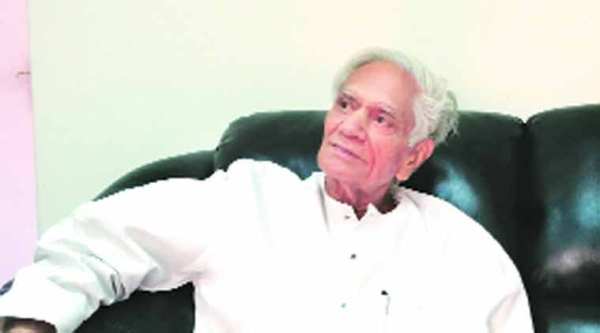Meet the new ICCR chief: Modi avatar of god, bigger than Gandhi
- 66 Comments
| Cards 40% Off + Shipping |
| Cards Now 40% Off + Free Shipping Snapfish Cards Sale Ends Nov 9th www.snapfish.com |
| Ads by Google |
 ‘Has affected the poor more than Karl Marx’. (Express photo by Shubhajit Roy)
‘Has affected the poor more than Karl Marx’. (Express photo by Shubhajit Roy)
Written by Shubhajit Roy | New Delhi | Posted: November 1, 2014 4:14 am | Updated: November 1, 2014 8:17 am
He is fluent in 16 languages, has over 596 publications to his name, and was awarded the Padma Bhushan in 2006 for “his contributions to academic life and public discourse”, but when Lokesh Chandra was appointed as India’s cultural czar Thursday, quite a few eyebrows were raised.
Why would the BJP government choose an 87-year-old Indira Gandhi loyalist, with links to leaders of the erstwhile Soviet Union, for its first big-ticket appointment in the Ministry of External Affairs (MEA) — as president of the Indian Council for Cultural Relations (ICCR), the country’s cultural interface with the world?
The answer becomes clearer when Chandra begins to list the qualities that he admires in Prime Minister Narendra Modi. For Chandra, Modi is a “man of ideas, not of ideology”; who from a practical point of view “supercedes” Mahatma Gandhi; who has made “a much more meaningful impact” on the lives of the poor than Karl Marx; and who is virtually an incarnation of God (“woh bhagwan ke avatar hain”).
Dressed in a white khadi kurta and dhoti, Chandra — who will head ICCR for the next three years — explains the reason for this big swing from a Congressman to a self-avowed Modi fan, in an interview with The Indian Express. “I have been a Congressman all my life. I was close to Indira Gandhi, I had personal relationships with several top leaders of the erstwhile Soviet Union. But for Modi, politics is only till the elections. After the polls, he is only thinking of the country.”
And that’s not all. “He (Modi) is very open in approach. He has never been vindictive. He rises above all political affiliations, and for him, national concerns are important. For the poor, he is like God. Unke liye, woh bhagwan ke avtaar hain (for the poor, he is an incarnation of God)… Look at his Jan Dhan scheme. Karl Marx wrote so many volumes on poverty, but what was his real contribution? Modi has made a much more meaningful impact to the lives of these poor.”
“Modiji”, says Chandra, “in some aspects, supercedes Gandhi when it comes to (a) practical approach.”
”He (Modi) kept a fast for nine days (during Navratra), and kept working, woh bhagwan ke avtar hain (he is an incarnation of the God). This shows he has great attachment to values, and India is based on a value system. He doesn’t have any foreign back accounts and black money. He doesn’t have a son or a son-in-law. For him, the country is his son and son-in-law. India needs such a PM.”
Chandra’s reply to another question – on some of his plans as the new ICCR chief – also provides enough clues to his appointment. He wants to connect India to south-east Asian countries through programmes based on the Mahabharata and Ramayana. He also wants to help “many South Koreans” trace their ancestry back to India.
”We can organise Ramayana and Mahabharata-based programmes with the south-east Asian countries like Indonesia, Cambodia, Laos. They have living traditions drawn from these epics,” says Chandra.
According to him, many South Koreans trace their lineage back to a princess from Ayodhya. “There are many South Koreans who have an Indian ancestry, we need to explore these areas,” he says, referring to the popular tale of Princess Suriratna who married King Kim Suro in 48AD.
According to him, at present 6 million Koreans with the surnames Kim and Huh from Gimhae, and Lee from Incheon, trace their ancestry back to this royal couple. He adds that the tomb of Princess Suriratna has a pagoda built with stones believed to have been brought from Ayodhya.
Chandra says he also plans to meet External Affairs Minister Sushma Swaraj after her forthcoming trip to Mauritius and Maldives.
Chandra is a well-known figure in academic circles and, as the MEA states on its website, his “major life-work is the study of cultural interflow between India and the countries of the world.”
Meet the ICCR chief
* Born in 1927 in Ambala, Chandra’s father Prof Raghu Vira was a scholar who wrote on Asian culture and its contribution to India’s linguistic development.
* In 1950, Chandra was awarded a doctorate in Literature and Philosophy by the State University of Utrecht (Netherlands) in recognition of his contribution to the editing of the Gavamayana portion of the Vedic work “Jaiminiya Brahmana”.
* The languages he knows include Sanskrit, Pali, Avesta, Old Persian, Japanese, Chinese, Tibetan, Mongolian, Indonesian, Greek, Latin, German, French, and Russian.
* Apart from the “Tibetan-Sanskrit Dictionary” and “Dictionary of Buddhist Art”, he has authored works such as “Materials for a History of Tibetan Literature” and “Buddhist Iconography of Tibet”.
* He has headed the Indian Council of Historical Research (ICHR) and was earlier Vice President of ICCR